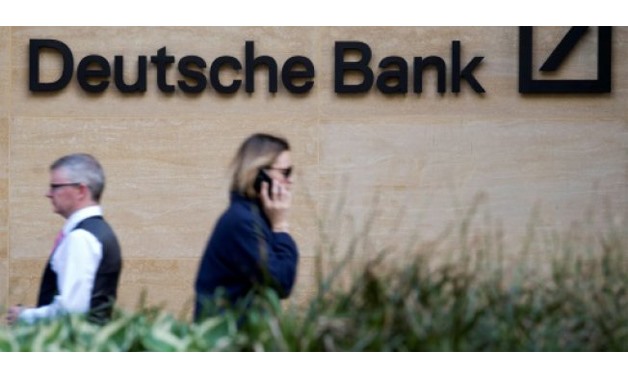
California's attorney general accused Deutsche Bank of manipulating interest rates at the expense of local US governments - AFP/File
CAIRO – 12 February 2020: "Egypt’s growth rate is expected to reach 5.8 percent and 5.9 percent in 2020 and 2021, respectively, up from 5.6 percent in fiscal year 2018/2019," global multinational investment bank and financial services company Deutsche Bank AG said Wednesday.
The German-based bank also anticipated the headline inflation rate to continue its downtrend to reach single digit during 2020. It clarified that the decline in exchange rate of the Egyptian pound against the dollar and the global drop of oil prices, along with government interference to control prices of food products, will help to curb the inflation rate.
“Recent moderate inflation rates came as a result of the stability of food products prices,” the bank explained in a report.
The report also saw private consumption rates to be recovered gradually.
Egypt’s statistics body announced previously that the annual consumer price inflation recorded 6.8 percent in January 2020, compared to 12.2 percent in January 2019. The announced rates remain within the Central Bank of Egypt’s (CBE) target range of 9 percent, plus or minus 3 percentage points.
According to Deutsche Bank, the improvement in new exports will continue as Egypt’s dependence on fuel imports will decrease due to its local production. “In addition, non-oil exports will witness a rise during the coming period along with the increase in production of gold, electronics and pharmaceutical preparations.”
The General Organization for Export and Import Control (GOEIC) revealed earlier Egypt's non-oil exports recorded $25.49 billion during 2019, compared to $25.14 billion during 2018
The report attributed the increase in production to the increased competitiveness of Egyptian production since the liberalization of the Egyptian pound in 2016.
It also stated that the state’s mega projects, which support the infrastructure, and foreign direct investment (FDI) flows will help in developing oil and gas wells, building the New capital and developing the Suez Canal axis.
Deutsche Bank expected the Egyptian pound to continue its rise against the dollar to reach levels of 1.5 by the end of the first half of 2020 and levels of 15 by the end of the year.
It also reviewed additional structural improvement in the current account and balance of payment, clarifying that the petroleum trade balance improved as a result of the decline in imports volume and achieving self-sufficiency of natural gas.
Egypt achieved self-sufficiency of gas after receiving the last shipment of liquefied gas at the end of September 2018.
The report also stated that the improved security conditions and investments in infrastructure contribute to increasing tourism inflows and rising Suez Canal revenues.
“Paying delayed dues to foreign companies will attract more FDI especially to the energy sector,” the bank expected.
Earlier, Prime Minister Moustafa Madbouli ordered the disbursement of 10 percent of the full value of arrears to exporters, in addition to the full payment of delayed dues of small-sized companies if their dues do not exceed LE 5 million.
Moreover, earlier announcements revealed that arrears settlement deals were reached with 67 companies as the government agreed to pay the companies LE 6 billion over five installments in return for carrying out extra projects or expanding their existing projects.

Comments
Leave a Comment